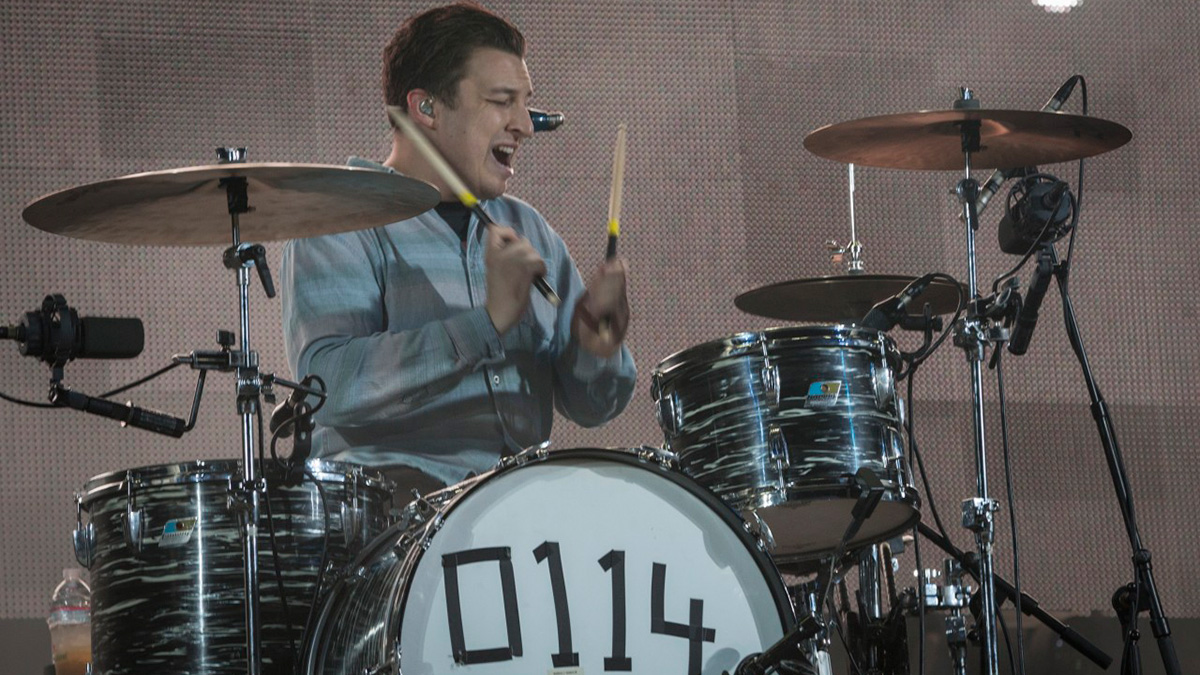Matt Helders: my top 5 tips for drummers
Plus: Matt on recording with Iggy Pop and Josh Homme

Matt Helders: my top 5 tips for drummers
As drummer for Brit world conquerers Arctic Monkeys, Matt Helders has amassed an army of fans, but it is on his latest project that he has truly proven himself to be at home on drumming's top table.
The project is Iggy Pop record Post Pop Depression, an album which Queens of the Stone Age mainman and Arctic Monkeys producer Josh Homme personally picked Helders to appear on. Speaking to MusicRadar, Helders admits that the position came with a hefty dollop of pressure as he looked to justify Homme's faith.
“The pressure I put on myself was that before I went in I was thinking how could I make it important that it's me playing on this album and not any drummer,” he says.
“I was worrying about how I could justify that it was me doing this. In the end I realised that I had been asked for a reason so I just had to carry on doing what I was doing. It was good though that I had thought that way. It's also the first time I had ever been in a band other than Arctic Monkeys so even though I had worked with Josh before it was a brand new experience.”
Pressure is nothing new to Helders though. He admits that he had felt under the microscope the first time he worked with Homme back on Arctic Monkeys' album Humbug.
“[When recording Humbug] I remember thinking that [Josh] had been in the studio with all of these different musicians at the top end. This time it was different because I was in his band, he wasn't just guiding my band in what to do in a producer role.
“Here he was both a producer and a band member. That went away pretty quickly though, we did some initial writing and rehearsing before Iggy came down. We had a couple of days going through ideas and it just felt quite natural, we got to it quite quickly.”
And when famed wildman Iggy came down all hell broke loose, right? Note quite, it seems that the Post Pop Depression sessions were surprisingly restrained and very much focused on the job at hand.
“I'd never met Iggy before. The first day I met him was day one in Joshua Tree. We went out for dinner to break the ice. It was unbelievable to work with him. He's incredible. He was also very friendly and funny. It was very appreciative that we were there. We were in this position of mutual respect. It was so cool. It was very civilized. We'd record at decent hours, we'd be finished by dinner. We'd have dinner and then listen to music or watch a DVD or something.
“That was one thing I took away from this album is that you don't have to work away to the early hours of the morning to get that magic moment. I find that it generally gets worse if you try to do that. When you do that you can end up chasing something forever and you never get there. There is a way of working efficiently and treating it like a job but without taking the fun out of it.”
You can't argue with those methods, nor the end product. Post Pop Depression has earned rave reviews and is Iggy's finest record for many a year. So, as the man behind the kit for such a stellar record it seems apt that we grilled Matt on his drumming wisdom and came out with his top five tips for drummers.

Have your own voice on the kit
“I think playing for the song is so important, but you also need to still come across as an individual.
“You need to have your own voice on the kit. I did this album with Iggy and played one of the songs to Alex [Turner, Arctic Monkeys frontman] and he said straight away he could tell that it was me on the drums. That was great, that's all that you can wish for as a drummer, really.”

Do as I say... and practice
“I never practice, I realise that's a bad thing to say. From the early days I never had a drum kit at home so I would only play with the band and I was a band drummer.
“I'd have a practice pad and I do some rudiments and stuff now and then. But I never practice on my own really. I used to play along to stuff and that was fun, but I never strived to learn and I should have.
“I'll see people do something and think, 'How did they do that?' I'll try it for a few minutes and then move on so my advice would definitely be to practice. You should do what I say not as I do!
“I do warm up, though. Although I warm up less than I used to. A lot of people warm up to the point that they're exhausted.
“I'm more into stretching before we play rather than doing any stick work. I'll do a lot of stretching and just making sure that your body is warm.
“A lot of it is in my head, if I have a gig where my arms feel tense it is because I'm worried about dropping the sticks. I realise that is psychological because I can play a soundcheck for half an hour and feel great without any warm-up at all.”

Play the gear that is comfortable for you
“Originally I never wanted to tour with my vintage stuff because it's not getting looked after properly. But once I got a dedicated tech I was able to tour with my vintage stuff and it did make a difference.
“Being able to play live with my old Ludwig kit, there's nothing like that you could get brand new. It's important to play the kit that you're most comfortable with.
“I remember the days of using other people's gear or renting gear and that can get into your head because if one thing is slightly off you'll be thinking about it all through the gig. You need to switch that off in your mind if you can. Nobody else cares that you're using a rental kit so you shouldn't either.
“Having said that, on this album, and when I've worked with Josh before, I've left the kit up to him. With a place like Joshua Tree with that studio it's so important to work with what has been proven to work there previously. People have tried to take gear into that studio and it just doesn't really work. So we used a Masters Maple kit that Josh had.”

Singing and drumming? Map it out
“Whenever a new vocal idea comes along, the drum part has already been done and then we're adding vocals and in the back of my mind I'll often think if I can even sing that part.
“We used to be a band that very much if we could not do something again the next day then we would not do it. So, we wouldn't put an extra guitar or vocals on a song if we could do it live again.
“We lightened up on that as time went on and concentrated more on making the records sound good.
“When it came to recreating my vocals live it was a case of getting the coordination against the rhythm of what I'm playing, often they will be different. Physically in terms of the breathing I've got that down now.
“I have to learn the part to the point that I can just play it without thinking and then concentrate on the vocal. In my head I will map out where each hit on the kit is compared to what word I'm singing at the time.”

Hit hard... but with finesse
“I saw Queens with Joey Castillo and it was so powerful, that was a big moment for me. But, I still had to go through a learning curve that it's not as simple as just hitting the drums hard.
“My friend who's a construction worker could hit the drums harder than I do, but it's not as simple as that.
“At first I went quite primal and caveman and thought I needed to whack the drums harder. But then you go into a studio and people are like, 'What are you doing, that sounds terrible.' I had to find a balance between hitting hard and finding a sound that is good.”
Post Pop Depression is out now on Caroline International.
Rich is a teacher, one time Rhythm staff writer and experienced freelance journalist who has interviewed countless revered musicians, engineers, producers and stars for the our world-leading music making portfolio, including such titles as Rhythm, Total Guitar, Guitarist, Guitar World, and MusicRadar. His victims include such luminaries as Ice T, Mark Guilani and Jamie Oliver (the drumming one).
